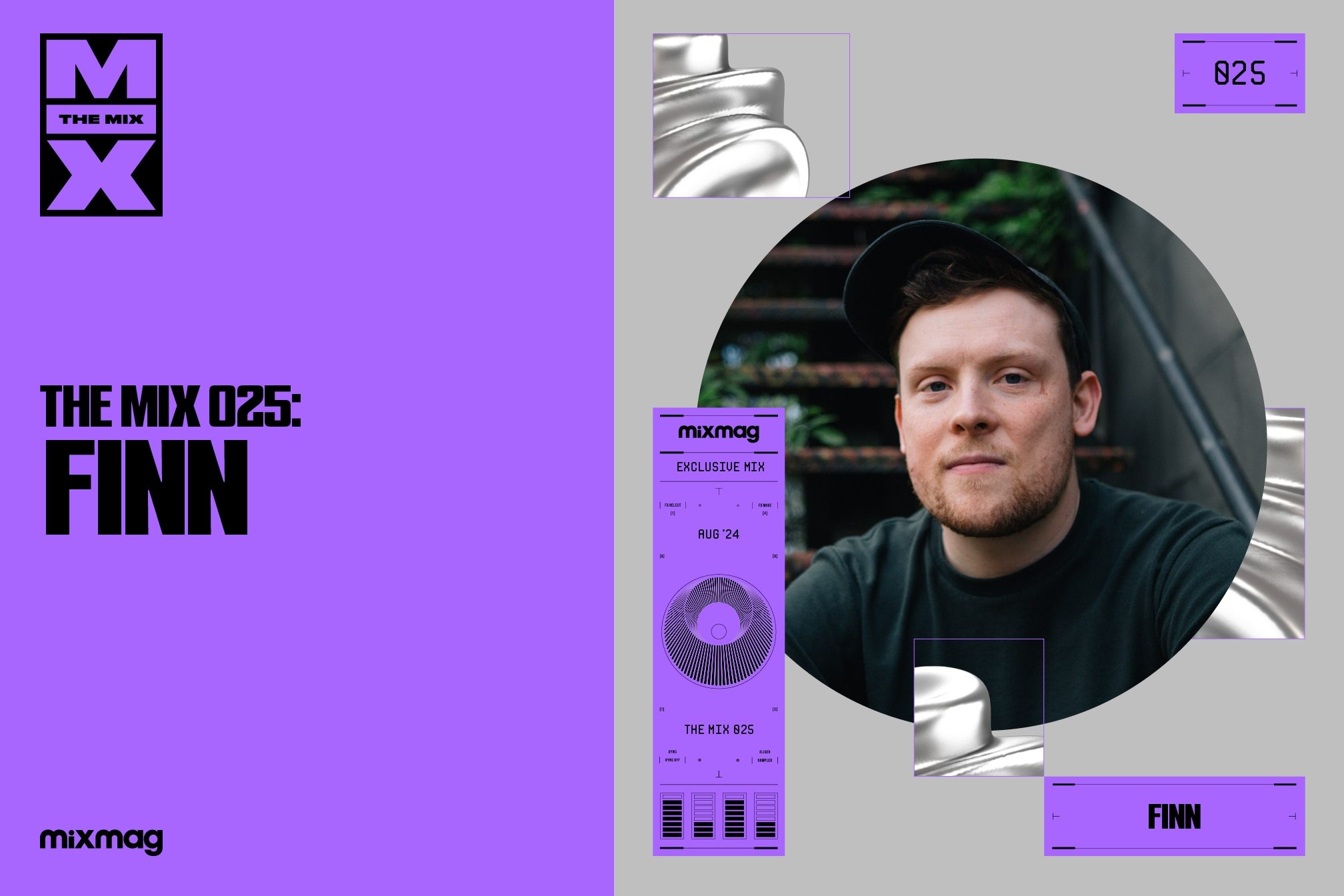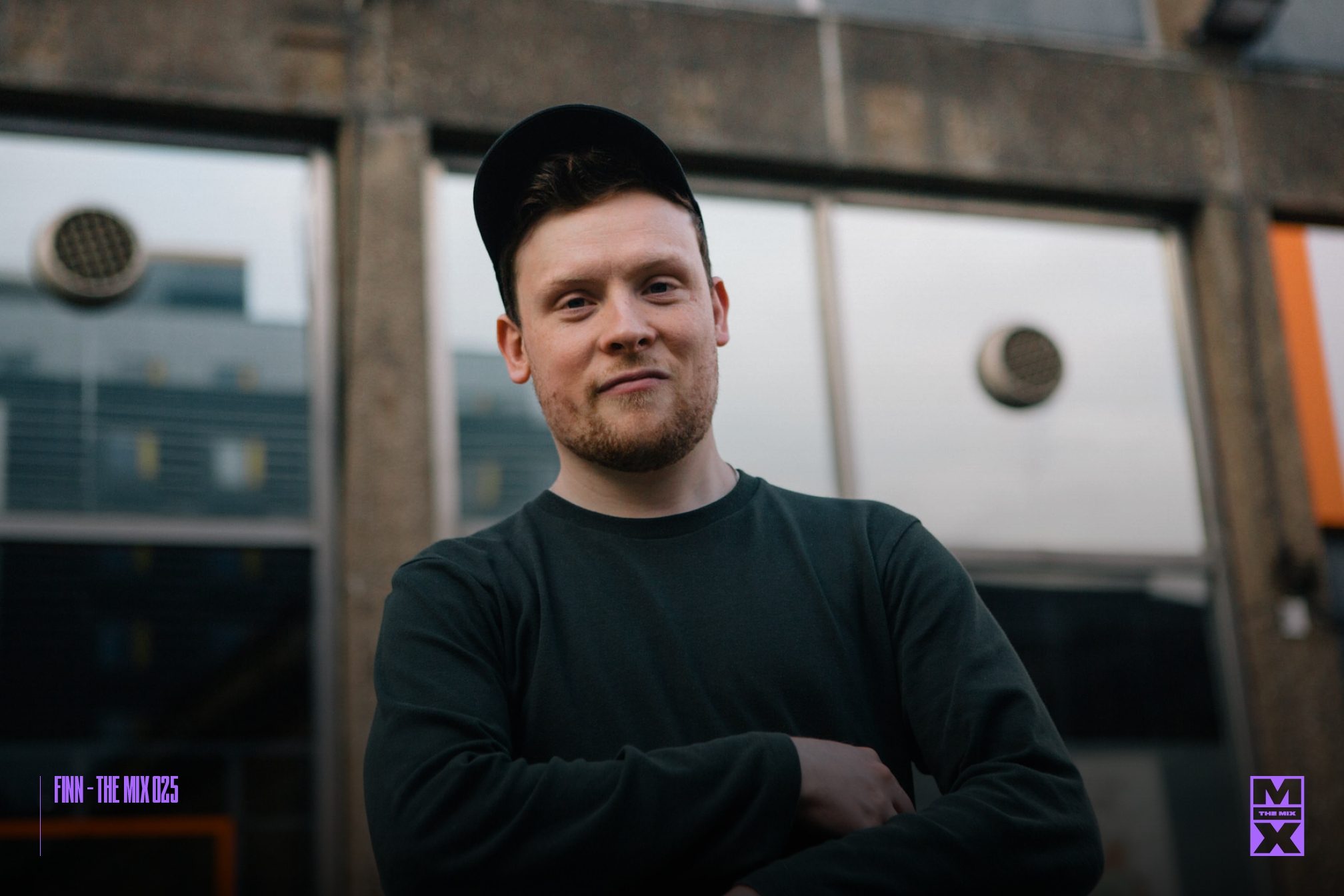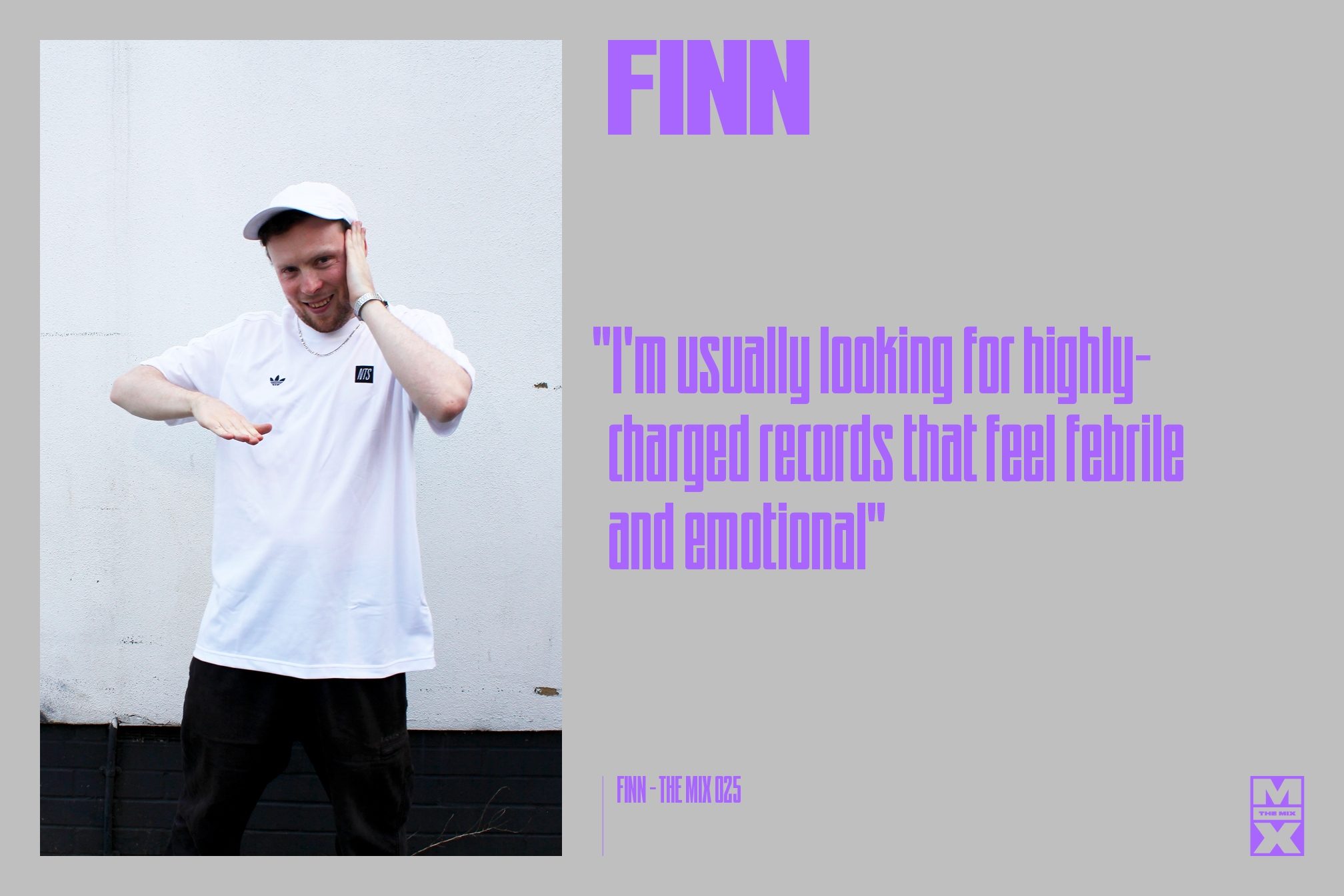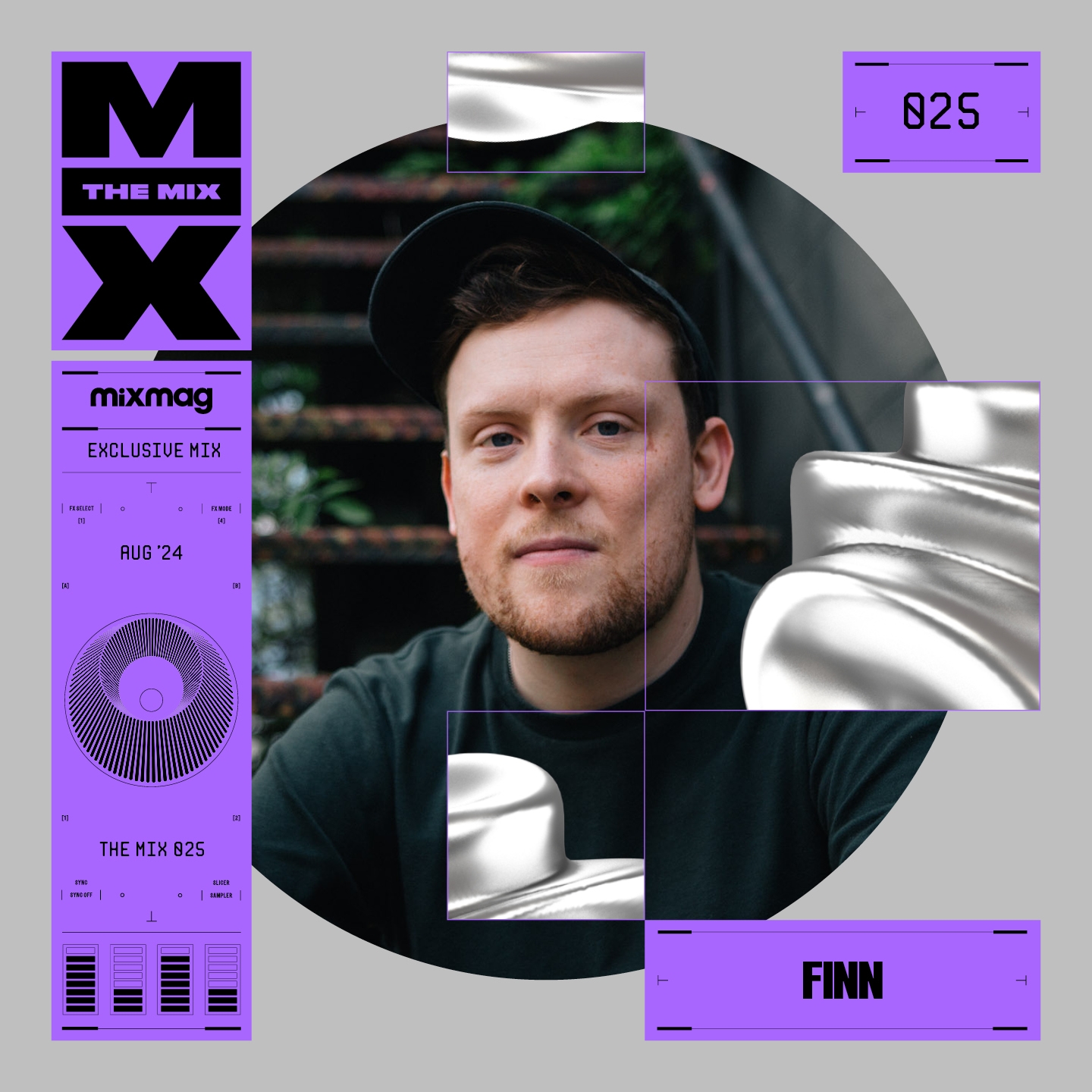 Music
Music
The Mix 025: Finn
Finn shares a mix showcasing the 'Sunday Club Mindset' and speaks to Jamaal Johnson about not really listening to modern music, being drawn to emotionally-charged sounds, and why promoters should get state funding
From a bedroom in Derbyshire, Finn found his own path into DJing. The now NTS resident, club promoter, label head, DJ and producer discovered dance music via deep dives through YouTube and Discogs, without the classic “older brother’s/sister's CD” to guide him. He always felt like he had some catching up to do, educating himself on the roots of club culture from those humble beginnings, and it was here where he gained a comprehensive education in the ‘90s house, grime, and UK garage sounds that have come to underpin his musical output.
His creative journey took hold in San Francisco, where he produced his grime influenced debut EP ‘Keep Calling’, before later becoming enticed by the danceability of house music. His simple yet devastatingly effective production style sees him build songs around emotive sample loops, with feeling and emotion taking precedent over any sort of intricate automation, production tricks or sound synthesis. Looking at dance music in a “rear view mirror”, he often finds inspiration within styles such as ‘70s soul, telling me that, ultimately, he wants his songs to be febrile and emotionally rich, looking for “stuff that wears its heart on its sleeve” in his samples.
Read this next: Finn: "I used to listen to happy hardcore on the bus to work"
A decade has now passed from that debut, and Finn has become a crucial part of Manchester’s deep and rich club scene, recently releasing his ‘Greatest Hits’ album, a somewhat “precocious” (his description) yet more than justified collection of his most impressive works to date, of which there are many to choose from. The last 10 years has seen him garner almost 20 million streams on his seminal 2017 hit ‘Sometimes The Going Gets A Little Tough’, and just under two million on the blissful ‘Do What You Want Forever’, a period in which he has worked with I. JORDAN, Ruf Dug, DJ Q, Jeremy Sylvester and many more huge dance music artists on remixes and features.
As his productions have gone from strength to strength, so have his DJ sets (and his amusing club culture commentary), becoming a cult hero in his spiritual home of Manchester through regular instalments of his A Party Called series, and more recently his daytime Sunday Club parties. During this time, he’s taken root at The White Hotel, a haven for Manchester’s underground sounds. Located next to Strangeways prison in Salford, the distinctly bohemian and hedonistic space provides the perfect stage for the emotional connection Finn strives for when he plays.
We spoke with Finn about his production process, his reflections on 10 years in the scene, the current state of dance music, and what the future holds for him. Check it out alongside his instalment of The Mix below

Why do you love dance music? What got you into DJing?
I grew up in the countryside, so I used to listen to a lot of dance music on YouTube. It was a huge thing for me, searching through archives, getting into old garage, hitting Discogs - I felt I was always digging. It wasn't until the last five years that I feel like I’ve started coming across records through friends, it always felt like I had to go out and find them on my own. A lot of people who grew up in rural areas will probably understand that mindset of being an outsider, not as in you feel excluded from the scene, but feeling as if you're walking into something and you’ve got a lot to learn.
And then did getting into production come hand in hand with that? Or did it come about later on?
I was DJing from around 18, I was getting some gigs in places like Sheffield, Hull and Manchester, and it felt like I was quite good at it and getting a little buzz around me - I guess I wasn’t getting a following, but I was playing some good sets! You get that buzz at that age of thinking this is what I'm gonna be. I then moved to San Francisco for university when I was 19 turning 20, which meant I wasn’t allowed in clubs. I looked into it, I could still DJ but there were a lot of rules: you’d need a chaperone, you weren’t allowed within certain feet of the bar, things like that - just total bullshit, it felt like I'd gone back to being underage, and I was almost ready for it to ruin my life - I felt like I’d just found this love that had been pulled away from me a little bit. Because of this I ended up spending a lot of time my bedroom in San Francisco where I just started pulling stuff together in Ableton and just goofing around. I was trying to scratch an itch essentially that I wasn't getting from DJing anymore. So yeah, that's kind of where it kicked off - I made my first two records-ish in San Francisco in the States.
And so who are some of your biggest production inspirations? Is there a track that you just love, or maybe one you wish you had made?
I always listen to this Ron Hardy record called ‘Love and Happiness’, which is kind of pushing the boundaries of what you'd consider producing a record in a modern sense, but Ron Hardy kind of mashed up two acapellas of ‘Love and Happiness’, I think it’s the Roy Ayers and First Choice versions. And he just puts it over this really early house track by Marshall Jefferson - late ‘80s, and the whole thing just sounds like it's creaking. It's out of key for a start, everything keeps crashing into each other, it goes out of time and then back in. But there's just a magic to it, there's so much inspiration there. I always show people that track and be like don't watch a YouTube guide on how to make this. Just wing it.
Yeah, it's true, those early ‘80s, ‘90s house records are the best house records we've had to date. Right? And they’re so raw, they’ve come from just messing around with a [Roland] 909. I feel like you can't recreate that in a way.
Yeah, we know that the best house records ever made were made by people who didn't have the means, weren't bothered, or just didn't have the time to spend three days on a snare. Why would you, why would you waste your time? Some people are gonna hear this and think that’s horrible advice, but honestly, I just think that's gospel as far as I’m concerned. Grime’s like that as well - you listen to it and you think 'that was just hammered out by someone!’
Read this next: 10 venues where genres were invented
Yeah, for real. I guess you could say that about a lot of the best subcultures - if you look at dubstep, UK funky, all the best tracks are just so raw, and if you if you gave them to a professional engineer, they'd probably ruin it.
100%. Yeah, I do feel like there’s this thing happening in dance music at the moment, where people start thinking about sound design in a way that's probably not good for songwriting, or dance culture.
Funnily enough I have some questions for you about that, but I first wanted to ask a bit more about your production process … Do you build your tracks before the samples, or do you kind of build around them?
If you listen to this 'Greatest Hits' compilation, it's brazenly obvious that I start with a loop usually, there's a lot of tracks that are very obviously loops. I've sort of tried to move away from that, also because you can get in a lot of trouble for that, and it makes your life a lot harder as a DJ, or producer. So yeah, I still try to start with samples. But I guess it's a bit of a process of maybe abstracting the sample, slowing it down and speeding it up or trying to find a feeling with stuff though a loop, trying to get something that you feel really strongly about that makes you respond quite emotionally. And then from there, I just try and build a track out, add drums, structure, whatever.
Sounds like a “less is more” kind of approach?
I feel like now, my process is to do as little to it as possible. The loop is key, once you've got the loop that's kind of as good as it'll be in a house music sense in my process. So add your kick, add a bass. And then if you add something and it doesn't work, just take it away. That’s kind of taken me a long time to become comfortable with because I think back in the day, I thought I needed to learn really detailed production or make complicated tracks.
How do you go about finding your samples, do you spend ages digging? Is it from YouTube? What's your process?
I guess I used to go looking for samples, but I think my listening habits have changed enough that I don't really have to go looking for them anymore. I listen to enough music that could feed into it naturally. There were a lot of R&B samples in my early stuff, and then I started sampling more New Wave records. So yeah, it's probably been a combination, but yeah, generally soul records, ‘70s soul records, which is so obvious and so tried and true for house music. Doesn't always have to be ‘70s, but just stuff that wears its heart on its sleeve is usually what I'm looking for. I'm usually looking for quite highly-charged records that feel febrile and there's a lot to them emotionally.

Congratulations on the greatest hits on the 'Greatest Hits' project. How do you feel having dropped it, reflecting on 10 years of releasing music?
Yeah, I guess time has flown by! That project basically spans my 20s - it’s quite weird to think about, it's a big decade, you go through a lot in your 20s. When I listen to those early records, I think about being in my mum and dad’s house, in a bedroom, back from San Francisco and everything feeling quite new to me. And now I think about how I feel about music and I think, oh, jaded loser? [laugh] No, I don't. But yeah, your feelings about music will change massively. One thing that did strike me when we were going through, me and Tom [Lea], we both completely agreed on what we thought my best records were, which I quite liked. I'm pretty proud of a lot of these records! I guess I'm only 30 so it's a bit of a premature ‘Greatest Hits’ thing maybe, but yeah, I felt I liked my back catalogue so why not!
So alongside the release, I saw you had a comment on the longevity of music and the idea of a back catalogue. Do you have any general thoughts on the scene and the consumption of music based off what you were saying there?
I read this Martin Amis quote where he said “the only true critic of literature is time” or something like that. I was thinking about the way I consume dance music, and I consume very little new dance music. The ‘90s stuff seems to scratch the itch for me in a way that other stuff doesn't. But I guess I was thinking about about how a lot of the records that I find, I don't have any relationship with the artist, you look them up and be like this guy only exists on Discogs. There’s a romance to that that I do quite like … maybe a greatest hits compilation plays into that a bit. I kind of look at dance music in a rear mirror. I do think about longevity a lot. Whether I think my records are gonna have that, I'm not sure. I think a lot of my stuff probably sounds too digital, doesn't sound like the ‘90s stuff I'm into, which is probably why I don't play it when I DJ out as much as I would. So we'll see. Maybe I'll come back in 10 years and think something different.
It interested me quite a lot where you said, “we're in a golden era of dance music for people who don't like dance music.” Are you talking here about edit culture? Or all this like watered-down pop-dance music … what are you getting at?
Yeah, I guess, edit culture and this kind of … ahh it's hard to talk about this stuff, because it makes you feel dusty! Remember when you were a bit younger, and people would be like, “oh, he's just an old head.” I'm not that for the record. I guess I meant more that going out nowadays, I feel you don't really hear classic dance records like you used to - crowds now seem to be seeking maybe a garage format they recognise or a flip of a record from their childhood. People want to connect to nostalgia in this way.
When I was getting into dance music, I was conscious that I had to learn a lot, and that I needed to learn what the big records were, and that if a Masters at Work record got played, and I didn't know it, I should know it! That's still the case, I feel like learning big dance records, finding a record and being like this was big in Baltimore in the ‘90s; I think that's quite important, in terms of a historical context, and building up your own knowledge. I guess I just don't really relate to a lot of what I see getting played on bigger festival stages - it feels everything's become a bit un-moored from what I consider a history of dance music.
I feel like everyone consumes things quicker and moves on quicker - it links to what you were saying earlier about the longevity of records. I think maybe when people see a set now it's cheap thrills almost. It's just a high and then the next drop ….
And I feel like we've had those moments before the UK, there was fidget house and stuff like that, we had the kind of EDM explosion that came over here a bit as well … but that stuff does always give way to people who are just really into records. I feel like we're about to see another give way moment… There I go again, sounding like the old heads [chuckles], maybe they were right all along!
Read this next: Has dance music got harder and faster?
Is there a particular kind of new avenue of dance music or new niche that you're really enjoying exploring, or that's quite rewarding for you right now? I know you've always spoken about bassline. Is there anything new?
I guess the thing I've been that's new for me that I've been really enjoying is this Sunday Club party I’ve been doing. And this isn't a new sound, we're going back to ’91 with that kind of format of Sunday garage. I did this thing for NTS on garage, where I connected house, New York house, Jersey house and garage in a way that I found really rewarding, and it opened up a new method of digging for me. So that felt new to me, although it's not actually new. But I guess we're the first generation of people who have access to these massive archives of old dance music as well. There's a new thing in here, which is about finding old records, which people couldn’t do in the ‘90s - you couldn’t hear anything you wanted from the ‘60s, for example. That is new, we are still enjoying a new process of revisiting old things. I think Ben UFO’s talked about this: If you hear a record for the first time, that's new! So, yeah, I guess that's a really long winded way of saying, I don't really listen to much new music.
Can you can you remember a particular set maybe or a back to back that really sticks in the memory, where you felt “in the pocket”?
Yeah, I tweeted about being “In the pocket” after the last Sunday Club. It was me, Nat [Esqueezy] and Ryan [BFTT] and it was still light. Because it was still light outside (it was a day party and the shutters were up), people were kind of dancing, raving, and I just kept saying to Ryan, “it's gonna get darker and it's gonna get better because people are gonna get more into it as the sun goes down.” So I just kept repeating “time is on our side. Don't panic,” and they were just like, 'shut the fuck up, stop getting in our ears with this weird, semi-mystical stuff'. The pocket is a really specific feeling, when you’re playing with another DJ and you’re waiting for them to play the next record, obviously you're quite sensitive to how that record affects what the vibe is, and whether that record is gonna change the vibe, whether that's going to influence how you pick your next tune. If someone's in the pocket, every time they play a record, you go, “Oh, yeah, perfect, absolutely perfect.” I think we had two hours, maybe it was three hours, we had a bit of a chunk of time, time was on our side. We were all on brand, in the pocket. No one was taking it where it didn’t need to go. Every record was picked perfectly.
You mentioned Sunday Club, that takes place at The White Hotel .. then you've also got A Party Called, which is at The White Hotel. I think it’s the best club in the UK, there’s something about it that’s just so amazing. How important do you think having that space is for you and your creativity?
Yeah, super important. I think having a club that I play at regularly is probably the most rewarding thing that's happened to me over the last few years, falling in with the best club in the country. Just the vibes, the set up, the sound - it’s an absolutely amazing space! It's off the beaten track, it’s gonna be underground, it's such an odd venue, it looks a certain way, it's going to attract certain types of people. You can have really transcendental, amazing moments on the dancefloor - if you go, you will get it. It’s changed the way I DJ, which is always a good sign in a relationship with a club. At the White Hotel you get given seven hours to play with, that's obviously gonna expand your approach to dance music, you've got time to fill in a way that you don't if you're getting booked at other people's nights, and you just get given your hour.
As great as it is that we have such spaces, clubs all over the country have been have been closing down, particularly outside of London, in places in the North. I’ve seen you be vocal about this online … If you could say something to the government about this, what would you say?
Berlin pledged 900 million Euros to their clubs and events sector, and I just thought, that's so alien to us as a culture in the UK to, put that kind of money into nightlife culture and dance music. I don't know what I'd say specifically - I think it'd be amazing to see funding opportunities opened up for promoting and promoters, in the country that's probably got the most influence on global dance music. I don't know, it feels like a really stupid move not to bet on that! Look at Wigan Casino - Wigan produced Northern soul … We could have a really vital and interesting dance scene, not just in London, or just in Manchester, all across the country!
What’s next for Finn?
Sunday club’s the most fun I’m having at the moment. I’ve got a bunch of parties, Physical Therapy in September that’ll be loads of fun. I’ve got another album which I’m tryna finish off which is new stuff. Might wait for next year to do that, or maybe under another alias. That album will come out either late this winter or early next year. That’s been fun to work on. It’s probably another step, very stripped back, very raw. I’ve been working on a new studio setup which will let me mix down cassette decks and things - I’ve been trying to learn that process. Got some features as well with Manchester people.
Can you tell us about your mix?
Been talking a lot recently about the 'Sunday Club Mindset' - people have asked me, what is the Sunday Club Mindset? Is it just a nonsense phrase to promote a DJ's new venture? No, it's a real thing and the proof is in this mix.
'Greatest Hits' by Finn is out now via Local Action, get it here
Jamaal Johnson is a freelance writer, follow him on Instagram

Tracklist:
Edzy - I’m Looking…
DJ Technics - Inside My Groove
Ricky Rouge - Strange Love (Dub Dub)
Phil Asher - Peace & Loves Comin
Backroom Productions - Trouble (Dub Version 3)
Dukeyman feat. Technics - Beloved
Gene Farris - The Gospel
Ty Holden . . KCC – Somebody
CM Toni - Hustle Ain’t Over
Todd Terry - Put Your Hands Together
Ursula - By Your Side
UBQ Project - Solutions
The Allen Street Crew - Thinking Bout Ya Love (Mystic Bill Dub)
GettoSwing Vol. One - A1 (Untitled)
1st Quote - All U Got 2 Do
Jomanda - I Cried The Tears (Piano Dub)
SDA - Love Will Find (A Better Way) (DJ Camacho Vocal Mix)
The Chosen - Visions of Rhythm
Fade II Black – The Calling (Reprise Mix)


